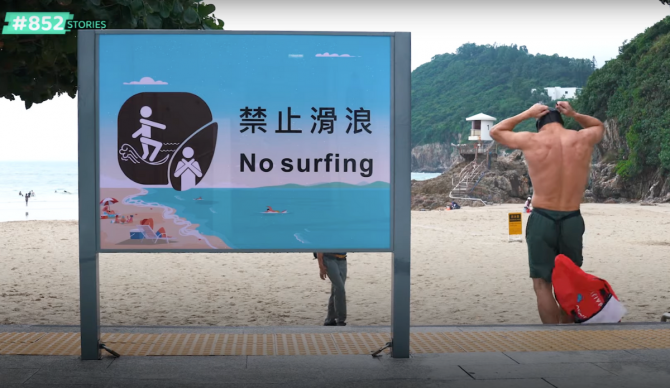Hong Kong’s Culture, Sports and Tourism Bureau (CSTB) has confirmed it “will not budge” on the longstanding surfing ban that’s seen an uptick in recent reinforcement. That’s according to a story published by the South China Morning Post after speaking to Adrian Pedro Ho King-hong, a lawmaker with the New People’s Party. Ho had been trying to meet with local lawmakers this year to have the ban amended only to finally get a call from the CSTB letting him know its stance.
“They said they cannot open Leisure and Cultural Services Department (LCSD) beaches for surfing because they think there will be complaints from the public,” Ho told the Post.
The ban has been in the public eye in recent months because it’s existed along Hong Kong’s 42 beaches for as long as anybody can remember to protect swimmers, but there’s been a recent spike in enforcement this year.
Officially, violating the ban can come with a fine of up to HK $2,000 ($260 USD) and up to 14 days in jail and according to LCSD Secretary for Security Chris Tang Ping-keung, the department has only made one other prosecution against illegal watersports activities during red-flagged periods in the past three years. Notably, that statement came after the department announced it was investigating two surfers found “illegally surfing at Big Wave Bay” on October 25. Reports of No Surfing signs appearing on Hong Kong’s 42 beaches have also begun this year, prompting local surfers, journalists, and lawmakers like Ho to question, “Why now?”
Ho had hoped a meeting with the LCSD could help map out ways surfers might enjoy waves without fear of prosecution.
“I specifically asked if there was a way to craft out a certain area or allow surfing at a certain time, at any beach, and the LCSD said they could not because that would create a public outcry,” Ho told the Post. “There are so many beaches in Hong Kong, there’s got to be one … where people will be more receptive. So why not do a survey or feasibility study instead of coming out with a bold statement and telling me categorically no without even trying to study it?”
An LCSD spokesperson reportedly responded to another inquiry about amending the current ban to allow for surfing only at specific beaches by repeating the current policy.
“The regulation states that no person shall, without reasonable cause or excuse, bring or use, or allow the use of any surfboard in any part of the waters adjacent to bathing beaches set aside for swimmers,” the spokesman said. “In other words, surfing activities have always been prohibited at LCSD-gazetted public beaches.”


